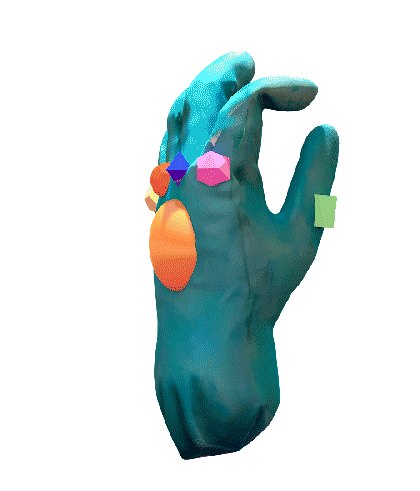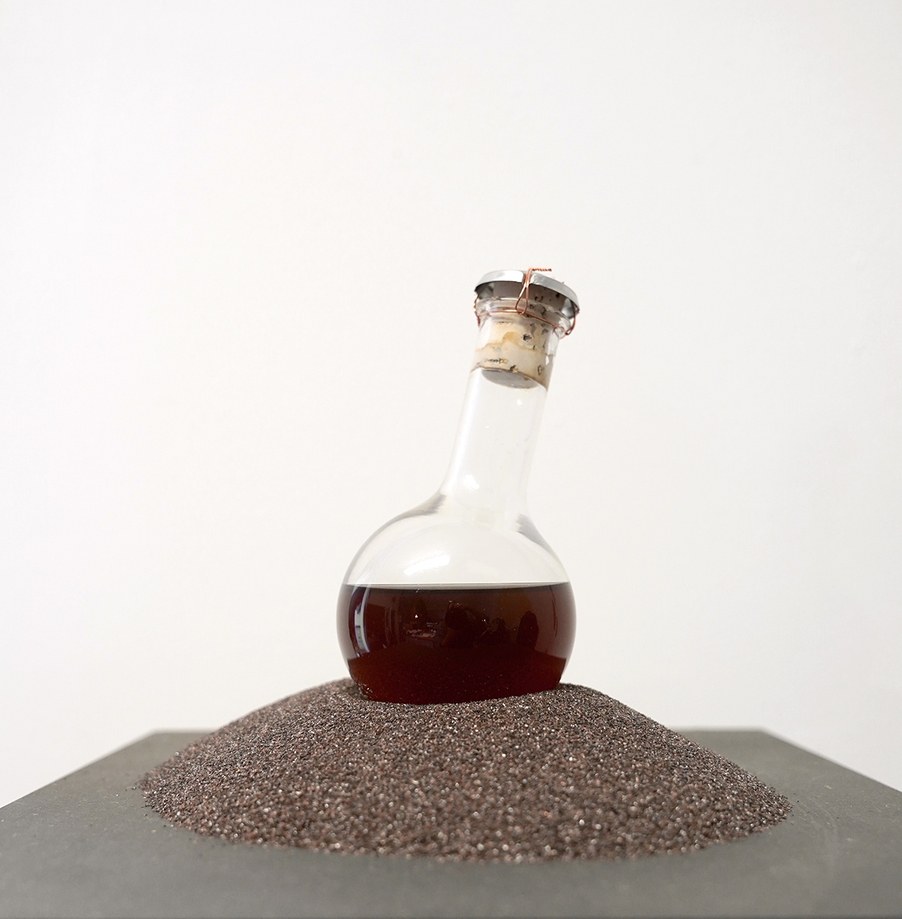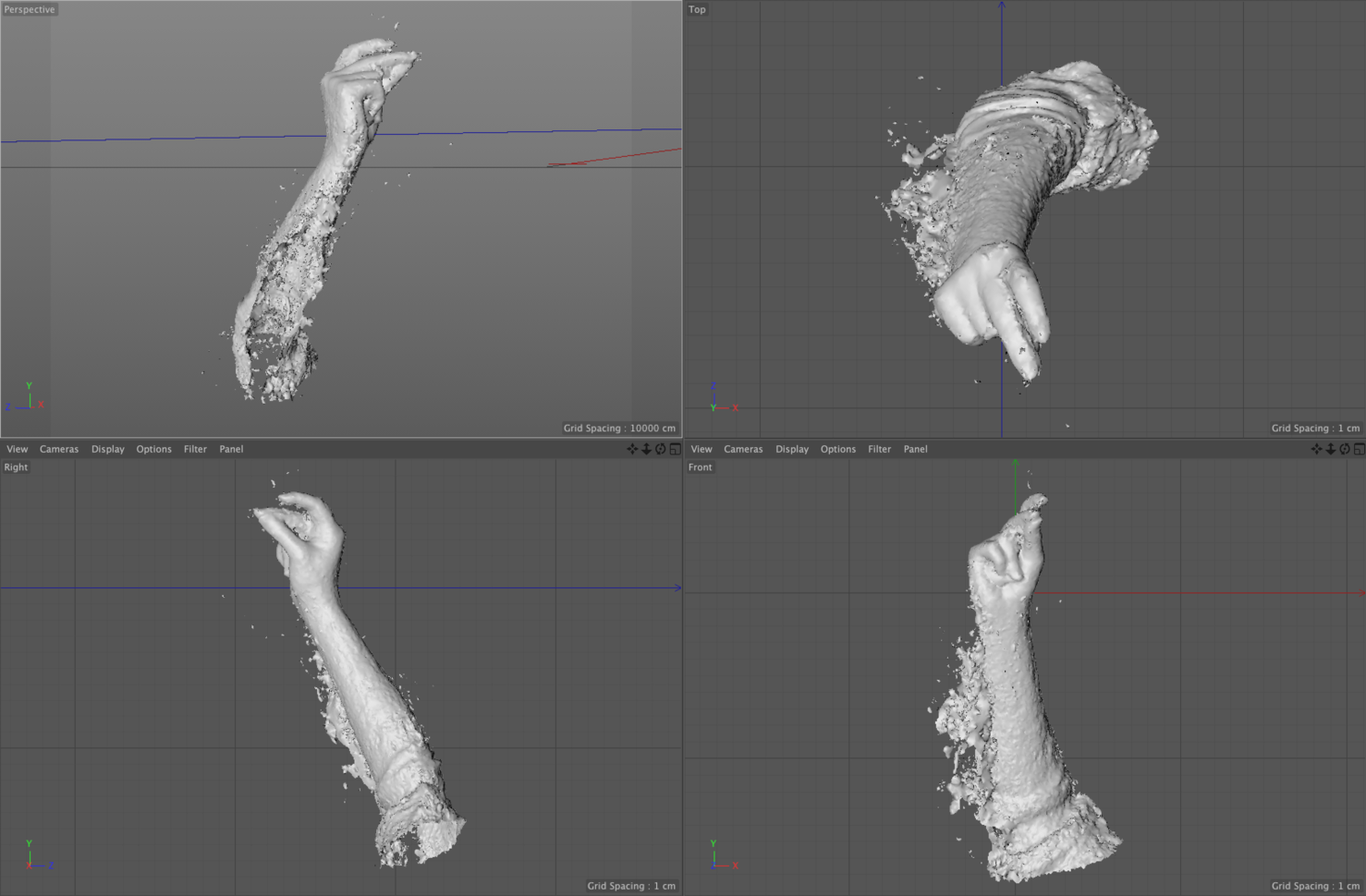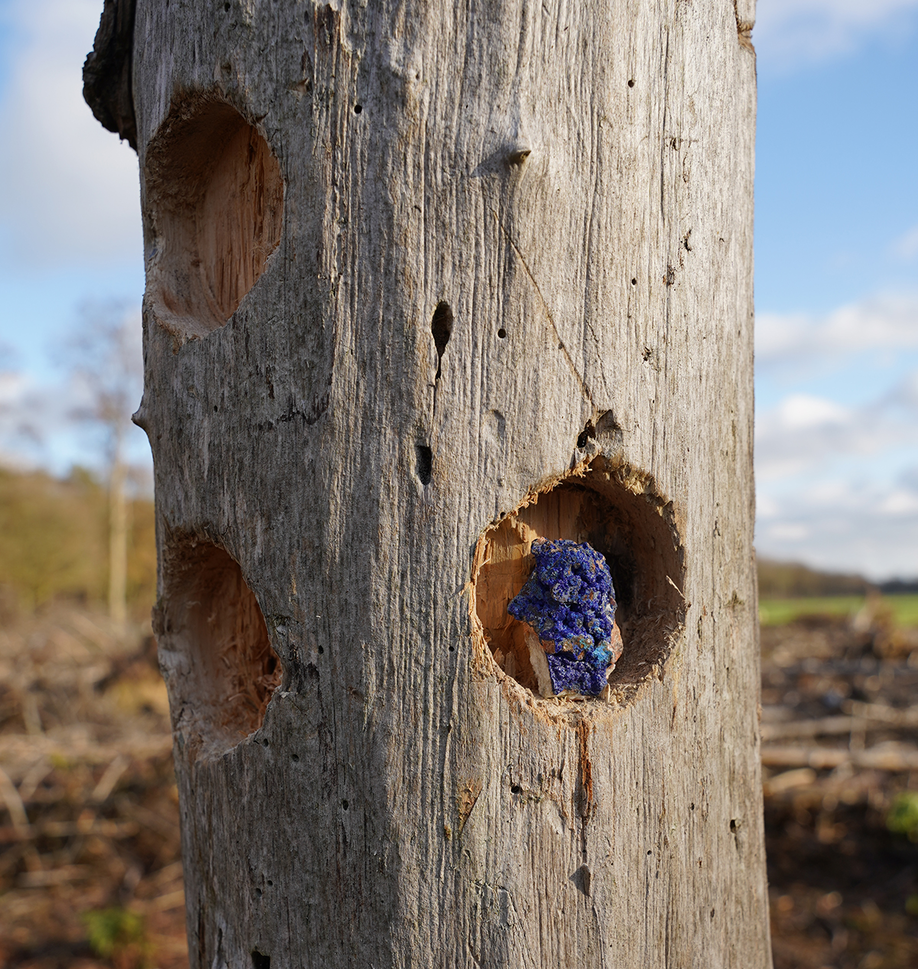I'm certainly not a therapist, nor do I have the ambition to become one. The Plot is, in a way, becoming myth by centering a narrative that hovers between facts (the reality of ecological collapse, the actual presence of the land) and fiction (proposed 'solutions', the attempted (re)activation of land, and the name - The Plot - referencing scenarios). It's only suitable to delve into methods that arise in other 'mythical' systems, whether that may be pop culture or the art of spagyria. This involves the use of special effects and (visual) trickery. This can be considered as an integral part of the poetic world of artistic research - as opposed to hard science - but evil tongues could define it as quackery.
The word quack comes from the Dutch word kwakzalver - which was spelled quacksalver in old spelling - a 'hawker of salve'. In the Middle Ages, quack meant 'shouting', because merchants of dubious medical products would call out their supposed wholesomeness to the visitors of markets.
Despite its negative connotation, 'quackery' provides me with the freedom that is needed within the artistic practise. And in my quest for solutions to dealing with ecological grief I may encounter not only dubious ones; I may stumble upon a very real ones.
There's also a sardonic pleasure in accumulating talismans, potions, or thought experiments. Some would call them mistakes.
Some parts in this chapter are taken from Mistakes. The artist talk. A 20 minutes and 20 seconds Powerpoint on steroids, made in April 2020, after my hasty return from a residency in New York, when Covid-19 hit the city.
The Kubler Ross model, or the Five Stages of Grief, postulates a series of emotions experienced by terminally ill patients prior to death, or people who have lost a loved one, wherein the five stages are: denial, anger, bargaining, depression, and acceptance.
Although commonly referenced in popular media, the existence of these stages has not been demonstrated and the model is not considered helpful in explaining the grieving proces.
This form of this chapter was inspired on an exhibition display at the American Museum of Natural History in New York.
Complicit.
A chapter from Mistakes. The artist talk, a .gif, and a website: com-pli-cit.com.
To accept blame, we must acknowledge our wrongdoings. Own up to the mistakes, accept the consequences, and be part of the solution.
Step one towards healing is admitting there's a problem. This work takes it a bit further, and tries to convince the viewer into accepting collective blame for the ecological and climatological crises. The message is softened by adding a relaxing, meditating soundtrack.
I asked a professional therapist to take a look at the work. She pointed out to me that imposing a feeling of guilt on a person is not considered to be a constructive method. "We do not do that," she said.
Thanos is a Marvel comic book character. In Marvel’s Cinematic Universe, Thanos becomes omnipotent by collecting the six Infinity Stones, which are mounted in a gauntlet. Motivated by witnessing the demise of Titan, his home planet, due to the exhaustion of resources, he comes up with a drastic solution.
With a snap of his fingers, he destroys half of all life in the entire universe. To him, this is an act of mercy; a way to restore balance. After succeeding in his mission, The Avengers – a gang of various Marvel superheroes including Iron Man, Black Widow, Captain America, and Captain Marvel, use quantum-time-travel to undo Thanos’ action.
When he nevertheless regains the Infinity Gauntlet, Thanos instead intents to use it to destroy all life, considering the resistance against his original action as ultimately equally destructive. Of course, The Avengers prevent this from happening.
I asked my friend and artist colleague Lisa Jeannin (Sweden) to distill a potion for me, one that helps to relief ecological grief.
She sent me an intriguing bottle and a short text, explaining what it's for. I'm saving the elixir for suitable events.
Further reading:
Is Thanos Right About Overpopulation? (Forbes)
Is Thanos Right? (The Observer)
The Thanos Solution To Climate Change: If you want to be evil about it. (Medium)
Why Thanos didn’t double resources. (UX Collective)
After decades, your company has changed the taste of your product from X to Y. This change has consequences for the daily routine of tens, or even hundreds of thousands of your product’s users, including mine. It does not sit well. Let me explain why.
One of the most persistent misinterpretations of the Darwinian term ‘survival of the fittest’ is that this involves a mechanism driven by the idea that ‘the strongest survives’. It’s in fact about the possibilities for a species to adapt to evolving circumstances. On an evolutionary, astronomical or geological scale, even sudden changes in environments usually take hundreds or thousands of years. Sometimes an asteroid, a volcanic eruption, a landslide or a flood can trigger adaptation, but these shifts are rarely global and the adaptations lag way behind the event. On a human scale, biological change has mostly been a slow process, invisible to a lifetime.
We are simply not equipped to handle large amounts of change in short periods of time, and still, we’re forced to not only adapt to increasingly substantial shifts in big issues such as the climate and biodiversity crises, but also to an unstoppable range of deceivingly insignificant changes, such as the rebranding of products, updates of digital operating systems, political emphasis, and demolished street views. All of this against a backdrop of progressing insights on human equality and emancipatory rights.
[-group loop='true' minDisplayTime='3000' initialDelay='0']
[ effect_in='fadeIn' type_in='sync' effect_out='fadeOut' type_out='sync']Come on[/]
[ effect_in='fadeIn' type_in='sync' effect_out='fadeOut' type_out='sync']Say it[/]
[ effect_in='fadeIn' type_in='sync' effect_out='fadeOut' type_out='sync']Get it off our chest[/]
[ effect_in='fadeIn' type_in='sync' effect_out='fadeOut' type_out='sync']Admit it[/]
[ effect_in='fadeIn' type_in='sync' effect_out='fadeOut' type_out='sync']It's not that hard[/]
[ effect_in='fadeIn' type_in='sync' effect_out='fadeOut' type_out='sync']Just say it[/]
[ effect_in='fadeIn' type_in='sync' effect_out='fadeOut' type_out='sync']It's our fault[/]
[ effect_in='fadeIn' type_in='sync' effect_out='fadeOut' type_out='sync']We'll feel better[/]
[ effect_in='fadeIn' type_in='sync' effect_out='fadeOut' type_out='sync']Confess[/]
[ effect_in='fadeIn' type_in='sync' effect_out='fadeOut' type_out='sync']Then we can move on[/]
[ effect_in='fadeIn' type_in='sync' effect_out='fadeOut' type_out='sync']Just admit it[/]
[ effect_in='fadeIn' type_in='sync' effect_out='fadeOut' type_out='sync']We are to blame[/]
[ effect_in='fadeIn' type_in='sync' effect_out='fadeOut' type_out='sync']Acknowledge it[/]
[ effect_in='fadeIn' type_in='sync' effect_out='fadeOut' type_out='sync']We did this[/]
[ effect_in='fadeIn' type_in='sync' effect_out='fadeOut' type_out='sync']Own it[/]
[ effect_in='fadeIn' type_in='sync' effect_out='fadeOut' type_out='sync']Confess[/]
[ effect_in='fadeIn' type_in='sync' effect_out='fadeOut' type_out='sync’]It's our fault[/]
[/-group]
This is a lot to ask of any population. Staple businesses like banks, public transport companies, phone companies, power companies, and healthcare organizations almost make a habit of renaming themselves each time a new board of directors is appointed.
Recently, we had to adapt to the circumstances of a pandemic. Many of us are still adapting. There’s a continuous sense of existential anchors being lifted out of solid ground. We’re adrift in ever deeper waters. Some people feel the need to throw their hooks towards anything that remotely resembles land: traditionalism, isolationism, conservationism, or even conspiracy theories. Formerly reasonable people start defending racist traditions, or set (metal) communication masts on fire out of fear for another new technology that’s being forced upon them, without proper preparation.
But these lands turn out to be floating plastic garbage islands, aimlessly drifting in the ocean. How desperate a population must be to mistake those for a future paradise?
The list of products that changed from X to Y within my lifetime is endless. My favorite perfume disappeared ten years ago, my significant other keeps looking for a shampoo that’s been discontinued for ages, hair clips that used to last for years now break within months, political alliances invent new overarching acronyms every four years, and so on.
This elixir was prepared according to medieval practice, a method called Spagyria. The swiss alchemist Paracelcus invented the name Spagyria from the Greek words Spao – which means to separate – and Agyro, meaning: to recombine.
The alchemical philosophy acknowledges a spirit, soul and a body in all matter: everything contains a consciousness on several levels. These philosophical principles are separated, worked on to evolve into their highest potential, and later recombined to unity. One can call the practice of Alchemy an assisted evolution.
I have made this elixir to reconnect with our roots and our sense of belonging, and to become an integrated part of Nature. It helps to understand the past, and to formulate a future where one is at home.
The elixir contains calamus root and mugwort. It is a classic ayurvedic mix to help find words and express one self: to be able to talk of large concepts such as environmental grief, to manifest ideas, to feel grounded in one self where one is always at home, and to feel grounded in the wilderness of Nature.
One should take 7 drops in a little water.
It can be nice to take before a workshop or conference where one needs to voice and channel important messages or when one feels lonely, lost and cut off from the world. It is about communicating, also with Nature itself.
Lisa Jeannin, October 2020
So, there's this friend of a friend, or is it his cousin? I'm not sure. Anyway, he's this powerful type, you know, body-built, really impressive. Comes from this place that got destroyed or something, because the people took all these resources, you know.
Well, he's collecting these gemstones, five of them. Or six. Five or six. All with different superpowers, one can bend time for instance!!! Pretty nifty rocks if you ask me.
He's searching high and low for these stones, crazy. So, when he's got them all collected, he's going to put them into some sort of glove. A metal gauntlet. And apparently - but you'd have to ask my friend about the details, I'm just relaying what I heard, these stones together make this guy really like the king of the universe. I kid you not.
And then, when he snaps his fingers, wearing this gauntlet, a random half of all living things just - poof! - disappear! Imagine that!
He thinks he's doing this out of an act of kindness, you know, to restore balance.
You want another drink?
Did any of us agree to these terms and conditions in flux? Your company states somewhere that it takes 14 days to get used to the new taste of your product. I tried it, and this is simply not the case. You replaced the unique experience of your product with a generic and exchangeable one, pleasing a wider audience that already has so many choices. All incentive for your loyal customers, who bought your product exactly because of its alternative properties, to stay loyal, is gone.I feel sad for the loss of this particular taste. I mourn something that was part of my life since childhood. Compared to having to leave a home because forest fires are devouring it, or because machismo power games demand it to be bombed, changing X to Y seems meaningless: a ‘first world problem’. Nevertheless, I’m arguing that this kind of corporate change-drunk behaviour on a larger scale is damaging the anchors we – either consumers/clients/users/voters, or all of those simultaneously – need.
I’d even argue that minimizing those seemingly minor changes would help forward substantial, positive changes. Instead of distrusting climate action including modifying personal behaviour, or resisting racial or gender equality as a means to anchor oneself to disintegrated ground, people will still have their products that taste like X, the fixed street views they’re used to, and brand names that are embedded in the memory of generations.
Relic of the hand of Saint Theresa of Ávila.
In order to change, some things need to remain the same. Don’t move around the buttons on your app. Don’t invent a new gadget every 6 months. Don’t cut down those trees. Don’t demolish that building. Don’t trade in that meadow for an industrial area. And please, don’t change the taste of your product from X to Y.
Alexandra Crouwers, Dec 4, 2020 Anno covidii







